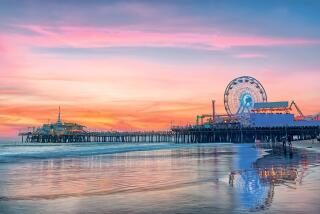Me-First Politics Is Latest Plague on L.A.’s House : Community: The city seems like a nursery taken over by toddlers, with the parents too paralyzed by indecision to put an end to the rowdiness.
In this year of Pharaonic plagues--from earthquakes and floods to riots and recession--the most serious sickness may be growing within the Los Angeles body politic. Rather than unity in the city’s hour of deep crisis, as was widely hoped after the riots, there has been a notable rise of political “me-ism” that threatens to frustrate, even undermine, recovery attempts.
A vivid example of this disturbing trend was the recent release of an anti-L.A. video produced by the management of the Hotel and Restaurant Workers Local 11. Designed to get the attention of the local hotel owners and operators, the “City on the Edge” video, made before the riots, mostly portrays Los Angeles as a place only a lunatic or masochist would visit.
The union’s justification for releasing the video despite its potential harm to the city’s distressed image is me-first politics in its most contorted form. To be sure, the local hotel industry has become increasingly hostile to worker demands as the tourist industry has declined. This year alone, tourist-related dollars are estimated to fall by 15%. The video, the union claims, was the only way to “get attention” from the media, the hotel industry and politicians.
No question, people paid attention, especially officials of competing tourist destinations, who will be tempted to use the video as a means of siphoning off more jobs from the region. Even without the recent earthquake swarm, the attack video is the last thing the $7-billion tourism business, the region’s second largest industry and employer of more than 300,000, needed.
Furthermore, from a union point of view, the video makes little sense, since the most obvious losers in any withdrawal of convention business will be workers, many of them unionized, at the city’s convention center. The winners will likely be less unionized competitors in such cities as Orlando, Fla.
If times were more normal, the Hotel Workers’ video tactic might seem simply desperate. Regrettably, this summer of our discontent has bred a spate of self-destructive tactics by a range of interest groups. For example, Danny Bakewell, who heads the Brotherhood Crusade, has virtually turned such tactics into an art form. He is fast becoming Los Angeles’ answer to New York’s Al Sharpton.
Speaking to two white visitors to South-Central, Bakewell said, according to Newsweek: “No one is going to stand anymore for you guys to enjoy an excessive lifestyle while we have nothing. . . . Next time, it’s your house that burns.” Ironically, Bakewell was recently appointed to the Rebuild L.A. board.
Statements like Bakewell’s indicate how far the city has traveled from the old days of coalition politics, once epitomized by a younger and more vigorous Tom Bradley. Today, many African-American leaders seem to prefer hectoring a shell-shocked Establishment for an ever larger proportion of the shrinking civic pie.
Some Latino politicians and activists, citing their sheer numbers, and Asians, seeking redress for the riot horrors perpetrated on their community, also demand a larger share of the public wealth. Neither groups’ leaders, however, seem to have focused on a vision for creating jobs and wealth in the community.
But the city’s minorities have no monopoly on me-ism. Indeed, perhaps no one has been a more effective champion of political me-ism than former Police Chief Daryl F. Gates, who inevitably couched his self-serving remarks in terms of defending “my people” against the interest of the city he was charged with protecting and serving.
Similarly, the city’s business Establishment, though the region was reeling from its worst recession in two decades, launched a campaign against the California economy, threatening, in classic me-ist fashion, to pull up stakes and move elsewhere if regulatory and tax relief were not immediately forthcoming.
One can only imagine what working-class hotel workers, much less unemployed inner-city residents, must have thought when they learned that local business leaders chose as their spokesman a man whose chief claim to fame is having moved some of his business operations to Utah. Two days before the riots, the spokesman even hinted, in an interview in Salt Lake, that he would move more. When such behavior is cast as within the proper purview of county-funded “business development,” maybe gangs should be rewarded with government funds for helping burn down parts of the city.
Put another way, the L.A. political scene seems increasingly like a nursery taken over by toddlers, with the parents huddling in the corner, too paralyzed by indecision to put an end to the rowdiness. Serious discussion about the long-term future--developing entrepreneurial businesses and services industries--is lost in all the commotion. This pathetic spectacle, fortunately, does not reflect the whole picture in Los Angeles.
Various grass-roots, interethnic coalitions of entrepreneurs and community activists may be able to avoid the me-ist trap. Rather than trying to outshout the extremists and perpetual complainers, they are seeking ways to create wealth and jobs. Although they come from every community and class, most define themselves not merely as business people, workers, Latinos, blacks or Koreans but, first and foremost, as Angelenos. Though largely unsung, they are the individuals most likely to revive the city’s increasingly moribund economic and political institutions.
More to Read
Sign up for Essential California
The most important California stories and recommendations in your inbox every morning.
You may occasionally receive promotional content from the Los Angeles Times.










